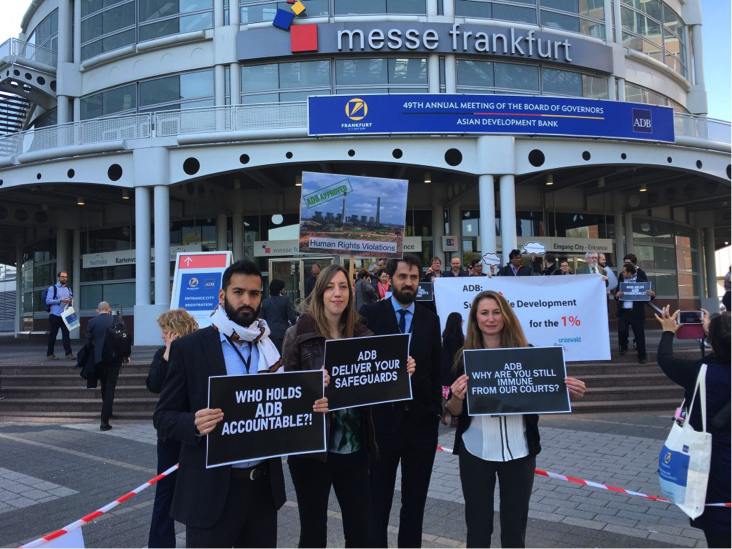
Tackle corporate impunity for human rights abuses
By: Anne Schuit (SOMO), Mariette van Huijstee (SOMO), Pietje Vervest (TNI), Anne van Schaik (Friends of the Earth Europe). On behalf of the Fair, Green & Global alliance
Human rights abuses by companies are regularly covered by the media: think of the Nigerian farmers whose land is contaminated through the oil extraction activities of among others, Shell; the murders and threats to Colombian union leaders which reportedly oppose the mining company Drummond; or employees in unsafe textile factories in Bangladesh who manufacture for brands such as Benetton. The Netherlands should actively seek to put an end to the impunity that characterises these abuses. And it should do so by using a ‘smart mix’ of judicial and non-judicial measures.
A unique window of opportunity to realise this has recently opened up. Although it has hardly been reported in the Dutch media, a promising development in addressing the impunity of businesses through international law has occurred: the UN’s Human Rights Council in Geneva adopted a resolution regarding this issue on the 26th of June. This in spite of strong lobby efforts from the USA and the EU, who resisted it by, for instance, threatening to reduce aid and investments.
Legally binding instrument
What is the resolution about? An intergovernmental working group will be established in order to ‘elaborate an international legally binding instrument to regulate, in international human rights law, the activities of transnational corporations and other business enterprises’. During its first two sessions the working group will discuss the content, scope, nature and form of the instrument, since it is still undefined and contains many challenges, including the exclusion of local businesses from the definition of ‘other business enterprises’. As for the form of the instrument, a treaty specifying the obligations of states to regulate businesses and hold them accountable for abuses seems the most feasible option. As for its content, several elements are likely to be further discussed: the criminal and civil legal responsibility of corporations, supply chain responsibility, obstacles to access to justice, extraterritorial jurisdiction, and remediation for victims.
Guiding Principles
The resolution was an initiative of Ecuador, supported by many South American, African and Arab countries, as well as over 600 civil society organisations. The resolution’s vote-distribution is noteworthy: the USA and the EU member states voted against it, while countries such as China, Russia and Pakistan voted in favour. The USA and EU say it is still too early for a binding instrument and they want to first give the Guiding Principles on Business and Human Rights (the UN’s 2011 framework concerning the private sector and human rights) a chance. They have expressed their concern that the Guiding Principles could be undermined by the new resolution. However, by announcing their opposition to the new intergovernmental working group they are themselves adding to that risk.
From the perspective of the victims of human rights abuses by businesses, the EU and the USA are not giving the best of themselves and fall short on their duty to protect human rights and ensure access to justice. Although the Guiding Principles represented an important step forward in determining the responsibility of businesses to respect human rights, and remind governments once again of their duty to actively protect human rights, the principles are not enforceable and allow impunity to persist. An internationally binding instrument is therefore pressingly needed.
Two complementary processes
Rather than opposing this international negotiation process, EU and the USA should support both the implementation of the Guiding Principles and the creation of a legally binding instrument. The two processes are complementary and are ideally suited to enforce each other. Until the international instrument is finalised (and negotiations like this often take several years, if not decades) the Guiding Principles offer a clear framework on how governments and businesses must avoid and address business-related human rights abuses, while at the same time the Principles can help shape the international instrument.
Call on the Dutch government
We call on the Netherlands to use its influence so that EU member states will participate constructively in the intergovernmental working group, as well as to set the protection of human rights and the eradication of impunity as priorities during the negotiation process. Additionally, the Netherlands should proceed with the implementation of the Guiding Principles at a national level, promoting them at an international level, and continue realising its duty to protect human rights. To summarise: the Netherlands should adopt and promote a ‘smart mix’ of measures to better protect victims of human rights abuses. Recurring cases of business related human rights abuse demonstrate that such protection requires much improvement.
Partners
-
FGG – Fair, Green and Global Alliance
Related content
-
-
Human Rights and Grievance Mechanisms Published on:J. OldenzielPosted in category:PublicationJ. Oldenziel
-

-
 CSO guide on how to use UN Guiding Principles on Business and Human Rights now available in PortuguesePosted in category:NewsPublished on:
CSO guide on how to use UN Guiding Principles on Business and Human Rights now available in PortuguesePosted in category:NewsPublished on: -
-

-
 Using business strategy analysis as a frame for human rights researchPosted in category:NewsPublished on:
Using business strategy analysis as a frame for human rights researchPosted in category:NewsPublished on: -
Posted in category:Publication
-
 SOMO submits input for update of UN List on corporate involvement in Israeli settlementsPosted in category:NewsPublished on:
SOMO submits input for update of UN List on corporate involvement in Israeli settlementsPosted in category:NewsPublished on:

